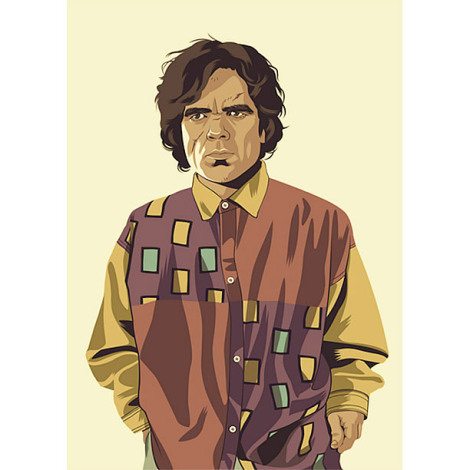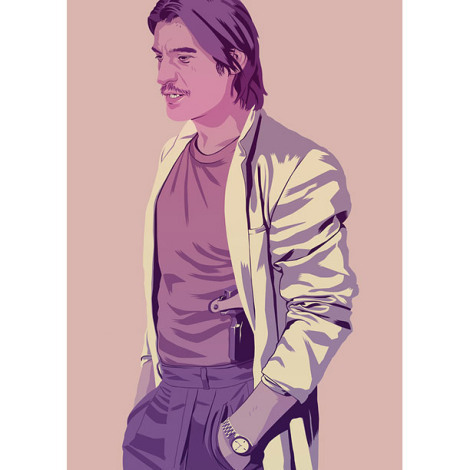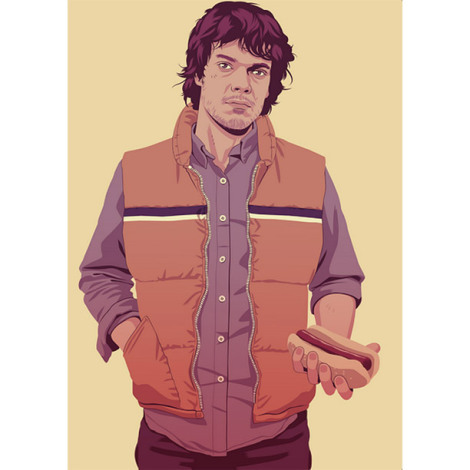Nick Milligan's Blog, page 13
July 10, 2013
LIVE REVIEW: Manics preach to the converted

LIONS ROAR: James Dean Bradfield of Manic Street Preachers on stage at Sydney’s Hordern Pavillion. Image courtesy of CLARE HAWLEY (asparay.com)
MANIC STREET PREACHERS
Hordern Pavillion, Sydney
Friday, July 5, 2013
While watching Manic Street Preachers on Friday night, it was easy to forget that you were in Sydney’s Hordern Pavillion and not the group’s hometown of Blacktown, Wales.
The vocal and rowdy 5000-plus crowd was a sea of red jerseys and Welsh flags.
“The Manics”, one of the most monumental and innovative acts in the history of rock music, returned to Australia with much bigger fanfare than their previous tour of intimate venues.
This time the trio were following the British and Irish Lions on their rugby union tour of Australia, playing to legions of countrymen.
Guitarist and singer James Dean Bradfield, towering and flamboyant bassist Nicky Wire and understated but powerful drummer Sean Moore opened with Motorcycle Emptiness, a track off their 1992 debut record Generation Terrorists.
The band, joined by an extra guitarist and keyboard player, played a selection of crowd favourites from throughout their diverse and ever-evolving career.

TICKETS AVAILABLE? This is what is wrong with Australia.
Their earlier glam-punk beginnings were represented by Little Baby Nothing, Motown Junk,You Love Us and Revol, and their later Brit-rock period was recognised with performances of You Stole The Sun From My Heart, Australia and Tsunami.
Bradfield picked up his acoustic guitar and before a sing-along of The Everlasting and Frankie Valli’s Can’t Take My Eyes Off Of You, he pumped up the poms by stating how the Lions were going to smash the Wallabies in Sydney the following night (sadly, he was correct).
In yet another tribute, the band changed the lyrics of their song Send Away The Tigers to Send Away The Lions.
You could forgive them for pandering, as they were basically playing to a home crowd.
A powerful and stirring finale of If You Tolerate This, Your Children Will Be Next – perhaps their most famous song in Australia– closed another astonishing performance from one of the best live acts on the planet.


July 7, 2013
Game of Thrones: 13 characters in retro gear
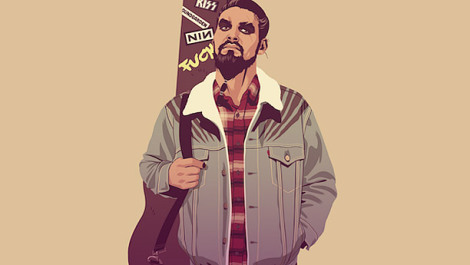 Just stumbled across these awesome artworks. They will be especially appreciated by Game of Thrones fans. They are the work of Tokyo-based Frenchman Mike Wrobel. You can see more of his art here: Moshi-kun
Just stumbled across these awesome artworks. They will be especially appreciated by Game of Thrones fans. They are the work of Tokyo-based Frenchman Mike Wrobel. You can see more of his art here: Moshi-kun
You can buy his artworks there too – prints, T-shirts etc. I think I’ll have to get Daenerys “Queen of Ferrets” for my wall at home.


July 2, 2013
Album review: Whitley – Even The Stars Are A Mess

WHITLEY’S RETURN: Lawrence Greenwood has released a stunning new album called Even The Stars Are A Mess.
WHITLEY
Even The Stars Are A Mess
4/5 (Dew Process)
The opening lyrics of Whitley’s third album, Even The Stars Are A Mess, suggest that the songwriter has found harmony both in his personal life and in his music: “It is not a mean world, it’s beautiful – I’ve seen it.”
This is an important declaration from Whitley, aka Lawrence Greenwood, who wrestled with existential questions and primal lust on his grandiose second record Go Forth, Find Mammoth, before embarking on a “farewell” tour. He then disappeared into the world, departing the spotlight of the Australian touring circuit. An artist that felt constricted by his creative situation, Greenwood journeyed to London and then off to Cuba, Panama and Peru. He ventured into the jungle to find peace, and the aid of hallucinogenic substances provided a different prism through which to examine his internal and external world. An epiphany on the Mexican coast confirmed that he would make a third Whitley album. The revelations gleaned from Greenwood’s global sojourn are presented on Even The Stars Are A Mess against a backdrop of slow, hypnotic rhythms and gentle, lulling song structures.
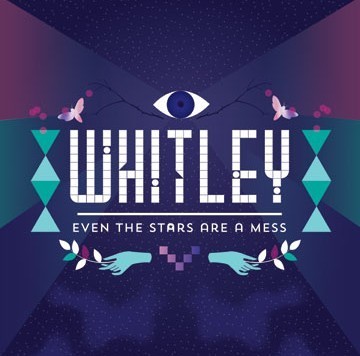
Whitley’s third album Even The Stars Are A Mess.
Since his 2007 debut LP, The Submarine, Greenwood’s lyrics have suggested a man in search of answers. His questions are big and dwell on the universe and how to navigate it. On The Submarine‘s track “The Life I Keep’, Greenwood sang “I still haven’t found what I’m looking for, I still haven’t found what I’m searching for…” with a warm, positive tone and an acoustic guitar. His debut was classically romantic and imbued with reverence for the grandeur of life and love. “I want to feel the rain pouring down, I want to feel the cold raising hair…” Greenwood sang on ‘A Shot To The Stars’.
His follow-up, Go Forth, Find Mammoth, was a lush, layered pop record that belied its dark subject matter. It is unlikely that the irony of his adoring female fans singing the unsettling lyrics “I am sitting, waiting and wishing that I could hunt you like a killer“, on the radio hit ‘Killer’, was lost on Greenwood. But on Even The Stars Are A Mess, the songwriter trades lust for wanderlust.
Whitley’s new album was recorded in an isolated church in the middle of the Italian forest, predominantly by Greenwood and co-producer Colin Leadbetter. Sustained organ hums and dulled percussion create a half-awake, echoed mist through which Greenwood ruminates, promises and apologises. “I’m alright now, I feel it in my bones now, I’m alright now, I feel no fear now.”
From opening track ‘The Ballad of Terence McKenna’, a nod to the American psychonaut and writer, Whitley’s third album uses hypnotic repetition across nine songs. Varied rhythms give each track its own character, from the heartbeat syncopation of first single ‘My Heart Is Not A Machine’ to the trip-hop procession of ‘Final Words’.
From start to finish, Even The Stars Are A Mess is a cohesive, entrancing aural experience. An exercise in emotive minimalism, the album is also Greenwood’s best vocal performance. Songs like ‘Alone, Never Alone’ and ‘OK’ are the work of an assured and talented melodic craftsman.
Greenwood might not have found every answer he is looking for, but now he is clearly asking questions from a much happier place.


June 24, 2013
Enormity: a double-edged word

TITLE DEFENSE: Enormity was almost named after an atomic bomb.
The title of Enormity is a metaphor.
The working title of the book was actually “Little Boy”, which is a reference to the codename given to the atomic bomb that was dropped on Hiroshima on August 6, 1945. It felt like a metaphor for both Jack’s impact on his new planet and also his immaturity.
But I changed the name to Enormity after reading a piece by journalist Laurie Barber.
He writes a weekly column that is syndicated to a number of newspapers, including my place of work – The Maitland Mercury. In each article he traces the genesis, history and evolution of a particular word.
“Enormity” is commonly thought to convey something that is “enormous” and is so widely misunderstood that the dictionary has now been altered to include that definition.
But the word “enormity” actually means evil or atrocious. Besides Enormity being a more powerful title than Little Boy, I also felt the word worked as a metaphor that better suited the book: something evil or depraved that is mistaken as or believed to be grandiose or worthy of awe.
I’ve included both definitions at the start of the book as a small clue – or tone – to begin the story.
But for those of you that are interested, here is Laurie Barber’s column on Enormity.
ENORMITY
by Laurie Barber
In this living language the meaning of some words is undergoing constant change. At times the change is so slow that we fail to realise what is happening. Take enormity for instance.
A few years ago at my place of employment I removed the word enormity from a report in which a correspondent was praising the efforts of a young sportsman. The correspondent complained to somebody in the office, who didn’t know the difference, and that person promised to draw it to my attention. There the matter ended.
But in the past week or so I saw in a regional paper a front page comment about another sportsman’s achievements. The report said the sportsman was only just realising the enormity of what he had done.
One of the Oxford English Dictionary’s definitions of enormity is “a gross and monstrous offence”. My American Dictionary says of enormity “a grave crime or sin”. Collins says of the word “a terrible crime or sin”. Stephen Murray-Smith in Right Words says enormity means “an act of great wickedness”. Eric Partridge in Usage and Abusage says enormity means “extreme wickedness” and the Cambridge Australian Style Guide says enormity carries a sense of strong moral outrage. The ABC says enormity is a noun meaning “an act of great wickedness” or “an atrocious crime”.
I often refer to the Newcastle Herald Style Book, which was edited by the first Australian Journalist of the Year and a person I considered to be a good friend, the late Denis Butler, who said of enormity: “A noun meaning a monstrous wickedness; don’t use it for anything to do with size.”
I could mention other experts, but I presume that by now you get the general idea.
Having said that, I concede that enormity is being used so much these days to refer to size that in time the wickedness associated with the word will almost disappear.
Why do we associate enormity with size?
From what I understand, an obscure word no longer in common use was enorm, which meant abnormally wicked, monstrous or outrageous crimes. For instance, in 1481 William Caxton writing an article called “the mirrour of the world” mentioned Sodom and Gomorrha’s “grete and enorme synnes”. This word enorm, which had a broad meaning of anything which deviated from the normal rule of behaviour, led to enormity which carried a similar meaning.
Over the years the meaning of enormity expanded, so that it covered anything deviating from the normal rule.
As a result, in more modern times because something huge has deviated from the normal rule people are starting to use enormity to mean something big.
Words such as enormous have carried similar meanings, but have already been accepted in our language as meaning huge, rather than wicked. My big dictionary says that if you enorm something you make it “monstrous”.
And that brings up another subject. I remember that in years past I got into trouble for a comment I made on radio in another town about the participants in a “monster tennis tournament”.
My plea, in defence, was that I couldn’t help myself.
I accept that enormity will soon be accepted as a word meaning little more than “very big”.
This year, and I didn’t keep the date, a letter writer to The Australian newspaper said: “The attempt to restrict ‘enormity’ to the sense of great wickedness never did catch on, and the Macquarie Dictionary will tell you that, for contemporary use, the word continues to carry its meaning of greatness of size. On that basis, everyone can carry on as they were.”
lbword@midcoast.com.au


June 22, 2013
Everything ends: Enormity Part Three arrives

EVERYTHING ENDS: Enormity Part Three closes a door and opens many others.
The release of the third and final instalment of Enormity closes a chapter in my life, but also opens many others. The completion of the book sees me arrive at a destination I dreamed of since primary school: the world of a published author. While in its earliest stages, the process of the book’s rise in popularity is underway and the positive response gives me the confidence to aim very high. There are many years of marketing and promotion ahead, but it is a challenge that can only bring further success. In my eyes Enormity is now impervious to failure.
I’ll recount this anecdote in more detail on Meadowlake Street in the future, but one afternoon I was sitting in a Circular Quay hotel room chatting to Nick Littlemore and Luke Steele. They were about to release the debut album of their new project Empire of the Sun. I mentioned to Littlemore that I was writing a novel. If my memory serves me correctly, he revealed he had a similar aspiration. But Littlemore gave me a very direct and simple piece of advice: “Just finish it.” He went on to advise that it did not matter whether I released it – or even told anyone about it. The act of simply finishing a novel from start to finish – something which so many aspiring writers might never achieve – would be the clearance of the biggest hurdle I would ever face as an author. To “just finish” a book would begin my life as a writer. Nothing could happen until I had experienced the entire process and endured it until an end point. It is simple advice that is easier said than done. But I never forgot it.
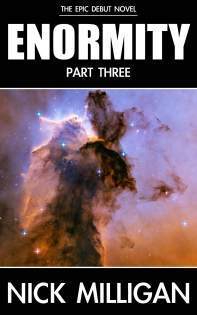
ENORMITY: Part Three – the epic finale.
I was nervous ahead of the release of Part Three of Enormity. It is undoubtedly the darkest section of the book and arguably the most confronting. It is the weirdest. The most abstract. Part Three is reliant on Part One and Part Two to draw the reader into this planet and to relax into a suspension of disbelief. Or an embracement of belief? The final chapter harbours the biggest twist in the book. I hoped it would hit the reader like a haymaker. A colossal king-hit. Only time will tell if this is its impact. But, so far, the response has been positive. Releasing a book is like putting a child into the world. I am responsible for its creation but now powerless to control its public reception.
It is apparent from explaining the release of Enormity to my friends and acquaintances that the majority of Australians have not joined the eBook revolution. This is quickly changing and I suppose authors like myself are championing the technology and encouraging Aussies to read their first eBook. But the confused reaction from many of my social media friends suggests that I need to focus on the American and UK markets if I am to sell larger quantities of the book. Australia will catch up. It’s exciting to think that I am attempting to penetrate a worldwide market that is expanding exponentially. The ease in which you can download and read books, without venturing to a brick and mortar store, will see an increase in readers and a greater likelihood of building a global fan base. I will post continued updates on this blog.
FUTURE PROJECTS?: Keep your eyes peeled for a collection of short stories and a second novel. This week a penny dropped for my second book and work may start in the next month.


June 15, 2013
Album review: Kanye West – Yeezus
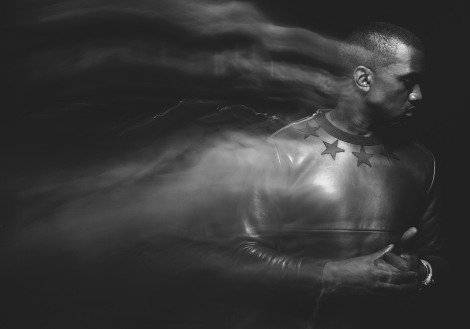
WELCOME TO HIS NIGHTMARE: Kanye West gets more dark and twisted on Yeezus.
KANYE WEST
Yeezus
4/5 (Roc-A-Fella/Def Jam)
Kanye West appeared on the cover of Rolling Stone seven years ago with a crown of thorns, his face caked in drying blood. So applying religious mythology to his own celebrity is not a new provocation from the world-famous hip hop artist. Nevertheless, “Yeezy” – West’s nickname – now merges with “Jesus” for the title of sixth studio record Yeezus.
It was hard to predict, perhaps even for West himself, where his music would explore after the game-changing masterpiece that was 2010′s My Beautiful Dark Twisted Fantasy. That album was an ambitious exercise in self-exploration. On Yeezus, the Atlanta-born 36-year-old father-to-be dives into another fantasy, but this one is far more “dark” and “twisted” than it is “beautiful”.
Recorded mostly in Paris, West again calls on a supergroup of producers and musical collaborators. Input came from the likes of Daft Punk, RZA, Rick Rubin, Tony Williams (West’s first cousin), Hudson Mohawke, Frank Ocean and Kid Cudi.

CAN’T BE COVERED: Yeezus by Kanye West.
The minimal production of Yeezus is suggested by the lack of an album cover. But it is confirmed on the Daft Punk-produced opener On Sight. Abrasive electronic buzzing turns into acid house rhythms over which West channels his inner animal. It’s raw, glitchy and dirty. It’s as if the rapper is alone in a darkened bedroom, a world away from the million-dollar studios that produced the mammoth layers of his previous record.
‘Black Skinhead’ feels like a continuation of West’s brilliantly nasty single ‘Monster’, and sees a return of his hedonistic, don’t-give-a-fuck anarchist. Tribal drums give the rapper a scintillating momentum as he spits: “Watch who you bring home,
they see a black man with a white woman at the top floor, they gone come to kill King Kong.“
On ‘I Am A God’ West leaves the fantasy and becomes trapped in a nightmare of his own creation. Stabs of house synths thump as the only accompaniment to West’s furious flows, briefly subsiding for a vocal interlude from Bon Iver’s Justin Vernon and then actual waking screams, piercing projections from the rapper’s subconscious. The track merges with ‘New Slaves’ in which West despairs that wealth and fame do not free you from oppression. He laments materialism. But, as he stresses: “You see these leaders, then there’s followers, I’d rather be a dick than a swallower.”
The sparse, buzzing backdrop continues under the testosterone-fuelled, primal ‘Hold My Liquor’ and ‘I’m In It’. The latter is one of West’s most sexually explicit numbers, omitting few details of the things he plans to do to the object of his lust. But then arrives the highlight of Yeezus, the stunning six-minute composition ‘Blood On The Leaves’. Sampling Nina Simone’s haunting take on ‘Strange Fruit’, a 1930s poem engrained in African American history, the song tells the story of a mistress who threatens to ruin the protagonist’s marriage. Given that ‘Strange Fruit’ addresses the public lynching of African American slaves, it gives ‘Blood On The Leaves’ a fascinating sub-text. West’s auto-tuned voice, despite drenched in his fallback vocal effect, has emotional resonance. It’s effective in the context of this electronic, half-awake journey.
Kid Cudi has one of the album’s most affecting vocal hooks on ‘Guilt Trip’ in which he asks: “If you loved me so much then why’d you let me go?” Crunched house beats form a spine beneath orchestral arrangements, as the production slowly swells in the second half of Yeezus. Then the record ends on the Graduation-esque ‘Bound 2′, which draws on a sunny soul sample from Penderosa Twins Plus One’s ‘Bound’. It’s a radiant close to an otherwise dark musical experience.
Coming in at just 40 minutes in length, West’s sixth studio album is a stark contrast to all his previous releases. It is by far his least accessible record and is likely to be his most unsuccessful commercial release. But the rapper doesn’t care. Nor should he. Without cover art and singles released to radio, Yeezus is not the creation of someone trying to make the Top 40. Yeezus lacks pop and hip hop conventions. West has risen to a place where he can make up and play by his own rules. Yeezus is a pure musical vision created in a vacuum. West might not be rising from the dead or dying for our sins, but he is challenging himself and he is challenging his audience. He demands to be heard. He dares you not to listen.


June 12, 2013
Album review: Daft Punk – Random Access Memories
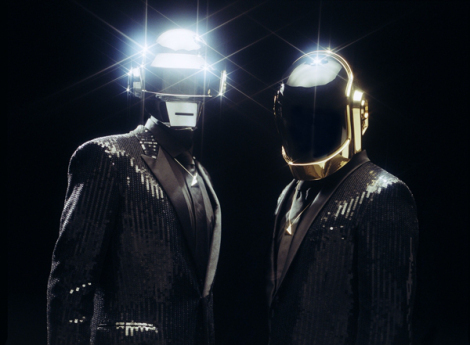
ROBOTS ROCK: Daft Punk have disappeared into their cosmic future world – and they have invited us to join them.
DAFT PUNK
Random Access Memories
4/5 (Sony)
In music and life, Daft Punk have fused technology with flesh and blood. The French pair, who put house music on the mainstream map in the early ’90s, have a vision that brings humanity into a robotic future. Hiding their faces behind space helmets, Guy-Manuel de Homem-Christo and Thomas Bangalter have disappeared into their robot-inhabited world. They are a living, breathing mythology.
Greeted with the mammoth expectations that influential pair have come to warrant, their fourth studio record, Random Access Memories, is a sweeping vision. Epic in scale (the record reportedly cost Sony $1 million), the album has the spine-tingling grandeur of all great science fiction. It’s hypnotic, trance-inducing, electrified and moving. Slow funk jams entwine with futuristic synths and samples. Random Access Memories is at once artificial and intelligent.
Not everyone understands dance music – and there’s no shame in that. When I first saw the music video for Daft Punk’s hit single ‘Around The World’ on Rage, I was unfuriated. I liked Deep Purple and Focus. ‘Around The World’ was repetitive. It was nonsense. Why would anyone listen to such garbage?
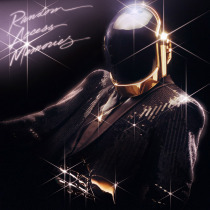
THRILLING LISTEN: On one of Random Access Memories’ album cover releases, Daft Punk pays homage to Michael Jackson’s Thriller.
Now, as a 29-year-old, I recognise the genius of ‘Around The World’. It helps to be aware of the club scene. It helps to be aware of drugs. But even in the absence of those elements, a listener can still engage with the rhythmic, visceral and primal soundscapes of Daft Punk’s music. Because the helmeted duo know something about exposing the subconscious. They know that their music is on a universal wavelength that transcends race, language and culture. ‘Around The World’ was – and still is – a simple statement of intent. On Random Access Memories, they push their sonic boundaries further than ever before but also maintain their distilled subject matter concerning the human experience.
Random Access Memories is at once artificial and intelligent.
Random Access Memories is a vibrant, sparkling miasma of anachronisms. The past and the future glimmer together in the same constellation. Where Daft Punk’s first three records were focused on the discoteques of the future, this fourth release cycles back to include more organic inclusions of funk, underground jazz and movie musicals. It’s an idea of the future that was shared by Philip K. Dick and his masterful contemporaries – kitsch, romantic technologies grounded in retro chic.
Random Access Memories opens with big drums and building synths before dropping down into a disco-funk groove. It’s interstellar. It’s smooth. It’s irresistible. A robot voice immediately suggests that you “let the music in tonight, just turn on the music, let the music of your life give life back to music.” It’s a seductive invitation. Especially when, on a later track, Pharrell Williams asks that you “lose yourself to dance”. Daft Punk’s most widely loved songs generally have a blazing ethos of jubilation and euphoria. Life is short, so love each other and party. On the first single from Random Access Memories, ‘Get Lucky’, Williams returns to set the scene: “we’re up all night ’til the sun, we’re up all night to get some, we’re up all night for good fun, we’re up all night to get lucky.” The song’s lyrics are hedonistic, hopeful and innocent.
Another guest Williams – Paul Hamilton Williams Jr – is enlisted for the stellar space musical number “Touch’. Williams’ delivery evokes the warm sentimentality of some of his other legendary compositions (like Kermit The Frog’s ‘Rainbow Connection’) and, when morphed with Daft Punk’s electronic-funk utopia, becomes a whimsical, cinematic and uplifting experience.
But Daft Punk’s latest effort is not just about visceral and orgasmic, good-vibe explosions. ”The Game Of Love’ is a slinking, melancholic dream sequence. ’Giorgio by Morodor’ pays homage to the great Italian electronic disco-innovator Giorgio Moroder, with an audio sample of an interview with him before expanding into a furious drum-heavy tornado. Scratched vinyl gyrates above a building tsunami of frantic drums, electric guitar solos, creeping synthesisersand funk bass.
‘Within’ is a serene moment of beauty – more yearning robot pain: “Please tell me who I am…” ‘Fragments of Time’ is a summery Steely Dan-esque groove, while ‘Doin’ It Right’ is a slow Calypso-pop moment of calm before Random Access Memories‘ epic finale.
‘Contact’ opens with a NASA voice sample of Apollo 17 commander Gene Cernan, as he describes a spinning object in space. In Daft Punk’s world, this is contact with another world. The final track leaves you breathless, launching from slow, resonant organ that recalls the vast cosmic, orchestral gaze of Electric Light Orchestra. It then builds into a whirlwind vacuum of twirling samples and manic, primal drum chaos. It’s a scintillating crescendo.
Daft Punk’s desires mirror Stanley Kubrick’s vision in 2001: A Space Odyssey. They aim to takes the listener both into the nether regions of space and also deep into the human soul. On both fronts, Random Access Memories is a triumph.


June 11, 2013
Nick Milligan: interview

GOODBYE PENTHOUSE: ‘Twas a shame to leave, but at least Ryan Grubb got to interview me there before I left. Here I am on the balcony… with the view. Memories…
“Thank you to the very attractive and intelligent Ryan Grubb for this article. It was written for his university character profile assessment, but I felt it would be nice to put an interview up on Meadowlake Street that discusses Enormity – for anyone that cares to know more about the novel. Enjoy.” - NM
TO INFINITY AND BEYOND
by RYAN GRUBB
There are no secrets in a spacesuit, which is definitely the case amongst the Australian music industry and the arrival of Nick Milligan’s three-part novel Enormity. I first heard about Milligan’s intention to write a novel over a social cigarette and dubious liquid matter at The Cambridge Hotel three or four years ago. Nick had just resigned as the editor of Reverb, Australia’s largest non-metropolitan streetpress and took on an entertainment journalist gig at Fairfax Media’s Maitland Mercury. I recently sat down with the interviewer, reversing the conversation roles to find out more about Enormity and the influence that Milligan’s career has had on shaping the novel.
Milligan is in the middle of moving from his Newcastle CBD unit to Hamilton. Is Enormity about moving Milligan’s CD collection? Milligan chuckles, “No.” Had to say it. Dad jokes aside, Milligan has one of the biggest collections of media in his lounge room that I have ever seen, second only to JB Hi Fi. Every CD is arranged in alphabetical order and every disc goes back where it belongs. Milligan’s professionalism is clear, although he admits: “There are so many great albums there that I will just never get time to listen to.”
Milligan offers a drink while pouring himself a glass of red, making the most of the opportunity to be asked questions for a change. Milligan points out that the plonk “will be one less thing to pack.” It is impossible not to notice, nor mention the eyes of Manchester Orchestra, Panic! At the Disco and Kate Hudson’s rose-coloured glasses, from the cover of the film Almost Famous, staring on in the form of signed posters hanging from the wall. All that’s left in Milligan’s penthouse apartment are a dining table, chairs and a Glad-wrapped media library – ready for transport – that any music fan would die to own.
Milligan finds it “difficult” to describe Enormity to people that inquire. “After the first few times I was asked what it was about, I kind of [laughs] stopped trying to answer.”
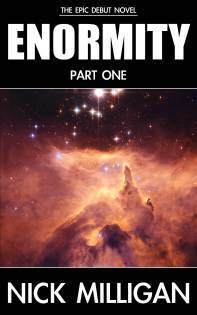
OUT NOW: Enormity: Part One
Enormity is essentially the story of a failed musician named Jack who, through the air force, joins the space programme. After a botched space mission he lands on a planet that similar to Earth – and inhabited by humans. Hungry and homeless, Jack finds a guitar and passes off some of Earth’s greatest rock songs as his own; swallowing, smoking, snorting and fucking his way to become the biggest rock star on that planet. Enormity becomes a much darker story; it radiates music industry satire to explore some deeper themes of existentialism and morality when Jack is confronted with the consequences of his lie.
Milligan explains the influence that being an entertainment journalist had when it came to making the switch from writing journalism to a big bang of science fiction/music fan fiction. “I’ve talked to probably a thousand musicians and cross examined them with their writing process,” he says. The author highlights an interview for Rolling Stone with one of his “all time heroes”, novelist Bret Easton Ellis. “It was a really monumental interview for me personally. Even though, in hindsight, it was an interview for Rolling Stone, it was more a one-on-one master-class about writing.” Milligan concludes by admitting that the candid 45-minute interview with Ellis is “the best thing I’ve ever done”.
There is no denying Milligan is a music-tragic at heart. This aspect of the 29-year-old is ironically personified through his signed Almost Famous poster and summed up through the thousands of albums, DVDs and books in his collection.
There is a feeling within Milligan that Enormity sits proudly on the shelf, waiting for Penny Lane to fall in love with it. “The book includes conscious decisions I made to be clever – I have put a lot of hidden little music references in there.” One of which, as Milligan describes, is where Jack and his band are interviewed by a critic. “That is my tongue-in-cheek poke at music journalists, like myself. He’s this little, nerdy guy with glasses and a band t-shirt,” Milligan laughs. “Even though they are the most famous musicians on the planet, they are desperate to impress him.”
But not all his decisions were conscious. Milligan feels as if people who read the novel are going to make a connection between the author and the protagonist. He stresses the contrary: “I am definitely not Jack.” This detachment from the character created a mental phenomenon for Milligan where: “He’s [Jack] saying things that I would never say and making decisions that I would never do.” Being in a character’s mindset while writing the novel, Milligan says “I’ve lost hours writing, writing, writing”, and has sometimes found himself “shocked” when reading over the graphic content in Enormity.
The decision was made by Milligan to release Enormity in three parts because “there were two clear places where I could divide the novel on a cliff-hanger.” Though for every article Milligan read about the positives of releasing a book in instalments, there were just as many articles that recommended “not doing it”. But he followed his instinct. “When all three parts are out, I’ll be releasing a complete version of it [Enormity].” Where, as Milligan says, a more structured marketing plan will follow.
Nick Milligan can be summed up as a man on the move, literally and figuratively. There is the thought with Milligan that, no matter where he is located, he has the talent and ability to go anywhere in the universe that his mind will take him.
Part one and two of Nick Milligan’s Enormity are available to download through Amazon.com. Part three will be available June 21, 2013 via the same retailer.


June 9, 2013
Listen to: Twin Lakes

TWIN LAKES: Jake Graham, Eddie Garven, Huw Garven, Sean Kelleher and (falling) Dan Pavez.
Eddie Garven and his band Twin Lakes have been gigging hard and writing some really absorbing and atmospheric music. I’ve just penned the press bio for Twin Lakes – it will be sent to publications with their upcoming debut single ‘Glacier’. Here’s the bio:
Good music grasps your attention. But incredible, timeless music pulls you inside it. The songs of Twin Lakes are an absorbing volume of emotional depth. Each melody is a pool in which to drift and drown. Echoed, haunting guitar intros and dynamic drumming arrive at the ears as if passed through the surface of water, arousing the synapses, and inviting you into an immersive sonic landscape. Shimmering, atmospheric and taut melodies lead you to the edge before some small inflection – a single note or harmonic moment – forces you to dive in. The aching, nuanced voice of Eddie Garven is the current that draws you beneath.
Born in the suburbs of Newcastle, during downtime for Garven’s other group, Seabellies, Twin Lakes existed in the ether as home recordings of coalesced ideas. But when an offer arrived for Twin Lakes to play a live performance, the singer and guitarist decided that it was time for his project to take the next step.
“The band was put together after being offered an opening spot at a friend’s show at the Cambridge,” Garven says. “I was a bit hesitant at first as the show was only three weeks away and I had no band organised – and only half a set of finished material. But I thought if I don’t do this now it’ll never happen.”
Garven brought together a group of accomplished musicians. Twin Lakes sees Garven work with his brother, guitarist and backing vocalist Huw. On bass is Dan Pavez, who plays in a project with Huw called Ornaments. On keys, bass, vocal and engineering/production duties is Jake Graham, who has a Bachelor of Music from Newcastle Conservatorium. On drums is Sean Kelleher, a fellow Seabellies member who is completing a Masters in Music at the Australian Institute of Music. Twin Lakes is a formidable group of talented artists.
In their year together Twin Lakes have played throughout Sydney, Newcastle and Wollongong, permeating the music scene with their layers of folk and rock. Their music has the captivating, pastoral resonance of bands like The Dears, Doves, Silversun Pickups, Bon Iver, Band of Horses and Midlake.
Debut single ‘Glacier’, with its crystalline sting, has a forthcoming music video directed by Australian actor Richard Wilson. This kinetic, wintery song is your first taste of Twin Lakes. It’s your chance to submerge. It’s a stalactite to the heart.


June 3, 2013
Album review: Queens of the Stone Age – … Like Clockwork
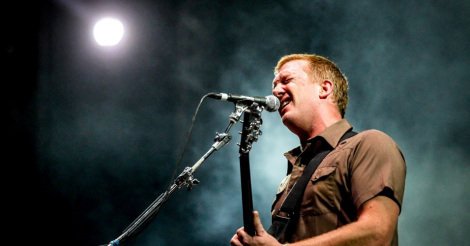
ROCK ROYALTY: Queens of the Stone Age frontman Josh Homme.
QUEENS OF THE STONE AGE
… Like Clockwork
4.5/5 (Remote Control/Matador)
Josh Homme never makes obvious creative decisions. The towering leader of Queens of the Stone Age writes music that has the twists and turns of an erotic thriller, drenched in theatrics and melodrama, and threaded with unexpected moments. He relishes a poetic suckerpunch. You can never truly predict what will be around the corner. The deep, sultry tone of his voice remains a potent and seductive instrument, and lulls the listener into the dark dreamworlds of his songwriting.
On QOTSA’s sixth studio record, … Like Clockwork, Homme crafts another arresting, dimly-lit journey through fuzzy grooves, primal energy and the hot atmosphere of the sun setting over an arid landscape. Such is the genre-bending nature the band’s music that the term “desert rock” was created just to describe it. There’s blues, stoner, glam, psychedelia, progressive and rock ‘n’ roll. It’s all absorbed by Homme’s psyche and reimagined in a cohesive soundscape. He continues to play with off-kilter time signatures, keeping a sense of unease in the listener.
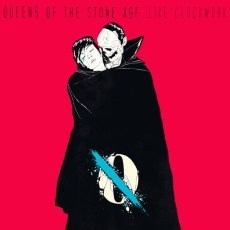
…Like Clockwork – album number six from Queens of the Stone Age.
Homme flirted with death in 2010 when his heart stopped during knee surgery. That experience informed … Like Clockwork, and the guitarist and singer ruminates on mortality on his band’s new album.
‘If I Had A Tail’ sees Homme express a desire to connect with his inner animal (“If I had a tail I’d swat the flies”), threatening to transform by moonlight and wreak havoc on the superficial members of our society. It’s this visceral, non-linear, impressionistic imagery that Homme does so well.
In single ‘My God Is The Sun’, Queens of the Stone Age delivers another thunderous heavy rock song. All of Homme’s music is permeated by heat – and not just from his smouldering voice. The influence of his Palm Desert upbringing gives his songs a distinct temperature. He is, indeed, a desert warrior: “Healing, like fire from above, kneeling, my god is the sun“.
‘Smooth Sailing’ is a sweaty, groove-laden, funked-up slab of acid rock. It highlights QOTSA’s trademark quality – music you can fuck to.
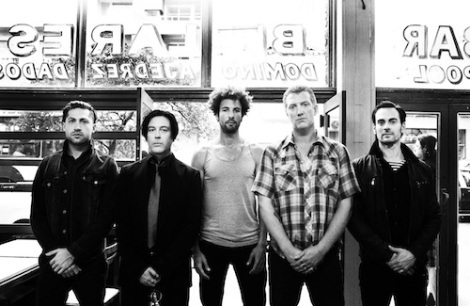
TURN TO STONE: The new line-up of Queens of the Stone Age.
As has been the case on previous QOTSA records, and his Desert Sessions and Them Crooked Vultures projects, Homme is the nucleus of an impressive roster of musical talent. Guest appearances on …Like Clockwork include Elton John, Scissor Sisters’ Jake Shears, Arctic Monkeys’ Alex Turner, Homme’s wife and Aussie ex-pat Brody Dalle and Nine Inch Nails’ Trent Reznor. His list of drummers and percussionists includes three of the best – Dave Grohl, Joey Castillo and Jon Theodore. Previous QOTSA members Mark Lanegan and Nick Oliveri are welcomed back into the fold.
The contributions of the guest vocalists are subtle – mostly just echoed vocal textures that haunt the production from its shadowed corners. They are all part of the Homme’s tapestry of dark and light, sun and moon, birth and death, and homage and innovation. It’s a world of danger and revelation.







